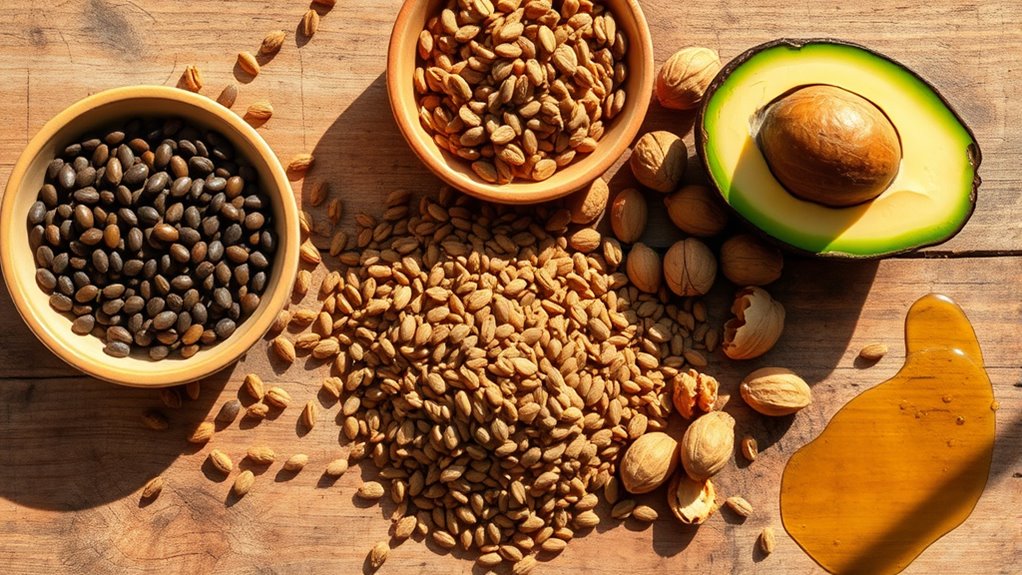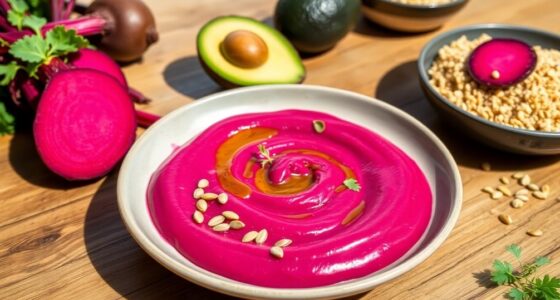To boost your vegan omega-3 intake, include seeds like flaxseeds, chia seeds, and hemp seeds, as well as walnuts and algae-based oils, which provide EPA and DHA directly. You can add these to smoothies, oatmeal, salads, or make tasty recipes like chia pudding or energy bites. Maximizing absorption involves pairing them with healthy fats and antioxidants. Keep exploring plant-based options and creative recipes to make omega-3s a regular part of your diet.
Key Takeaways
- Plant-based omega-3 sources include flaxseeds, chia seeds, hemp seeds, and algal oil, which provide ALA, EPA, and DHA.
- Incorporate seeds and nuts like walnuts, flaxseed, and hemp into meals for easy omega-3 boost.
- Vegan omega-3 recipes such as chia seed pudding, walnut spinach pesto, and flaxseed energy bites are simple and nutritious.
- Maximize absorption by pairing omega-3 foods with healthy fats, vitamin E-rich nuts, and antioxidant-rich fruits.
- Including plant-based omega-3s supports heart, brain, and skin health without relying on supplements.
Top Plant-Based Sources of Omega-3s
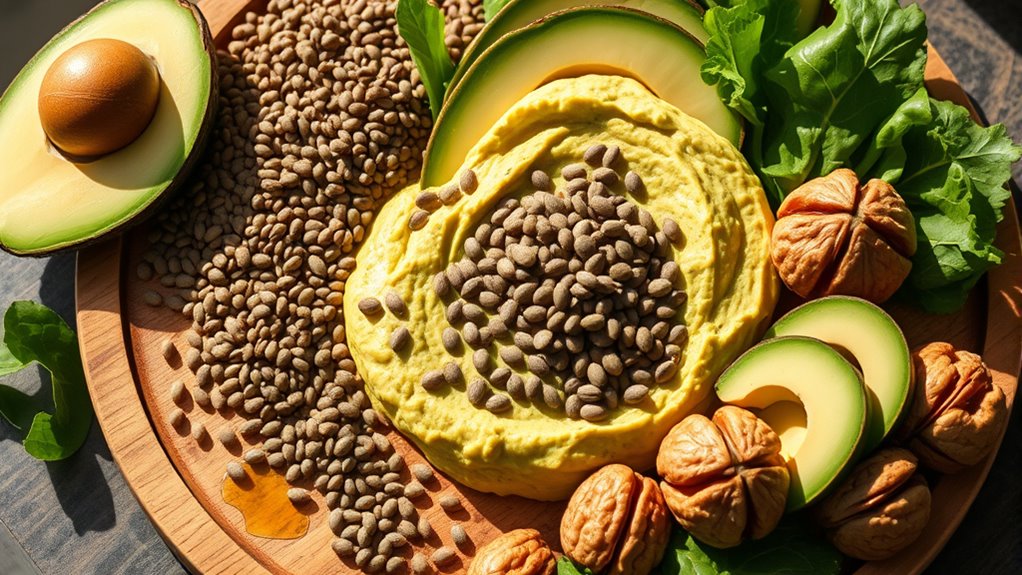
If you’re looking to boost your Omega-3 intake on a plant-based diet, there are several excellent sources you can include. Flaxseeds are one of the best options; just a tablespoon or two can provide a significant amount of ALA, the plant-based Omega-3. Chia seeds are another powerhouse—easy to add to smoothies, oatmeal, or baked goods. Hemp seeds are also rich in Omega-3s and offer a nutty flavor, making them perfect for sprinkling on salads or yogurt. Algal oil, derived from algae, is a direct source of EPA and DHA, the forms your body uses most effectively. Incorporating these foods into your meals can help you meet your Omega-3 needs without relying on animal products. Additionally, pantry organization can be a helpful way to keep your pantry and kitchen accessories organized, making it easier to incorporate these healthy ingredients into your daily routine. Proper general ledger coding can also streamline your meal planning and shopping processes by keeping track of your nutritional goals and expenses. Using effective fraud prevention tools in your meal planning apps or online grocery accounts can help safeguard your personal data while managing your shopping list.
Incorporating Seeds and Nuts Into Your Diet
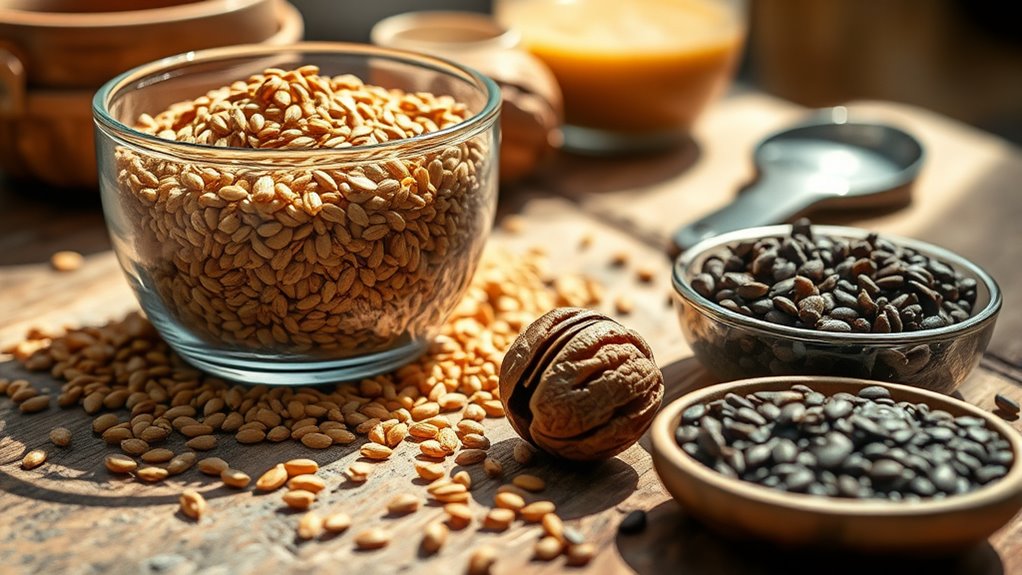
Adding seeds and nuts to your meals is an easy and effective way to boost your omega-3 intake. You can sprinkle chia seeds or flaxseeds onto your breakfast oatmeal, blend walnuts into smoothies, or toss a handful of hemp seeds into salads. These snacks and toppings are not only convenient but also packed with healthy fats that support your overall health. Incorporate a mix of almonds, walnuts, and pistachios into your daily routine for variety and maximum benefit. Roasting them lightly enhances flavor, but raw options retain more nutrients. Keep a jar of mixed nuts handy for quick snacks or add seeds to baked goods. Regularly including these nutrient-dense foods helps you meet your omega-3 goals without much effort. Diversify your diet with healthy fats to ensure comprehensive nutritional benefits.
Delicious Vegan Omega-3 Recipes to Try
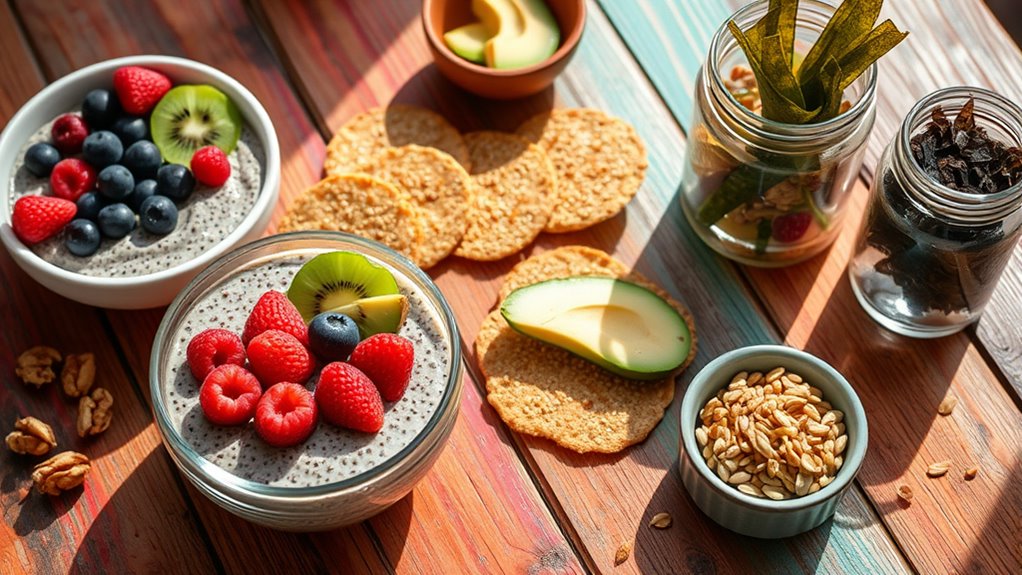
Incorporating seeds and nuts into your meals is a simple way to boost omega-3 intake, but you can also explore a variety of flavorful vegan recipes that highlight these healthy fats. Trying new dishes keeps your diet exciting and guarantees you get enough omega-3s. Here are three delicious recipes to start with:
Explore tasty vegan recipes with seeds and nuts to boost your omega-3 intake and keep your diet exciting.
- Chia Seed Pudding – Mix chia seeds with plant-based milk, add fruit, and refrigerate for a creamy, omega-3-rich breakfast.
- Walnut Spinach Pesto – Swap pine nuts for walnuts in your pesto for a nutrient-dense sauce perfect on pasta or toast.
- Flaxseed Energy Bites – Combine ground flaxseed with oats, nut butter, and dried fruit for a quick, healthy snack.
These recipes are easy, tasty, and packed with plant-based omega-3s. Automation in food production is also advancing, making it easier to access a variety of vegan products enriched with omega-3s.
Tips for Maximizing Absorption of Plant Omega-3s
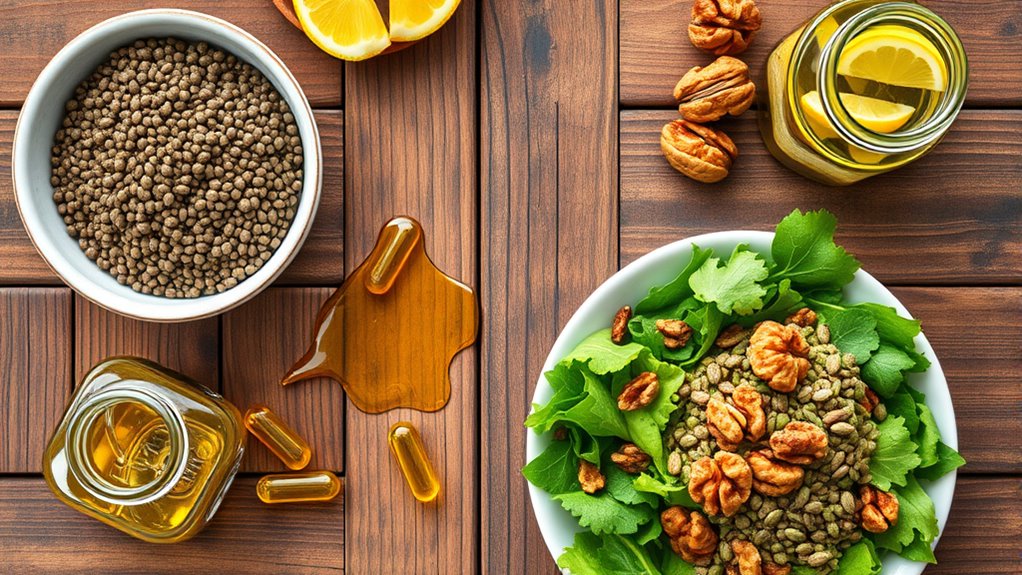
To maximize the absorption of plant-based omega-3s, it’s essential to pair them with nutrients that boost their bioavailability. Combining omega-3-rich foods with healthy fats helps your body absorb these fats more efficiently. For example, add a drizzle of olive oil to your chia seed pudding or toss flaxseeds into avocado toast. Including vitamin E-rich foods, like nuts and seeds, also supports absorption by protecting omega-3s from oxidation. Here’s a quick guide:
| Nutrient | Food Sources | Benefit |
|---|---|---|
| Healthy Fats | Avocado, nuts | Improve absorption of omega-3s |
| Vitamin E | Sunflower seeds, almonds | Protects omega-3s from oxidation |
| Antioxidants | Berries, spinach | Reduce oxidative damage |
Enhancing your diet with these nutrients can maximize nutrient uptake and ensure you get the most benefits from plant-based omega-3s. Additionally, understanding the history of pinball machines can inspire a fun and nostalgic way to incorporate recreational activities into your lifestyle. Pairing these nutrients optimizes your body’s ability to utilize plant-based omega-3s effectively.
Benefits of Including Omega-3s in a Vegan Lifestyle

Including omega-3s in your vegan diet offers numerous health advantages that support overall well-being. These essential fats help reduce inflammation, which can lower your risk of chronic diseases like heart disease and arthritis. Plus, omega-3s are crucial for maintaining brain health, improving memory, and supporting mood stability. Incorporating enough omega-3s can also promote healthy skin and hair, giving you a vibrant appearance. Here are three key benefits: 1. Enhanced heart health — omega-3s help lower blood pressure and triglycerides. 2. Brain boost — they support cognitive function and mental clarity. 3. Reduced inflammation — helping manage autoimmune conditions and joint pain. Additionally, consuming plant-based omega-3 sources like flaxseeds and chia seeds can help you meet your nutritional needs without relying on supplements. Incorporating plant-based omega-3 sources into your diet ensures you get a natural, sustainable supply of these vital fats, and choosing sources with a high omega-3 content can maximize these benefits. Consuming healthy fats from plant foods is also important for overall nutrient absorption and health. Regularly choosing nutrient-dense foods supports overall health and well-being.
Frequently Asked Questions
Are Vegan Omega-3 Supplements as Effective as Fish Oil?
You might wonder if vegan omega-3 supplements are as effective as fish oil. While fish oil naturally contains EPA and DHA, vegan options often rely on algae-based sources, which can provide similar benefits. These supplements are generally effective, but absorption rates can vary. It’s important to choose high-quality, reputable brands. Ultimately, both can support your health, but consulting with a healthcare professional helps determine the best choice for you.
Can I Get Enough Omega-3s From a Plant-Based Diet Alone?
Did you know that nearly 90% of people don’t get enough omega-3s? You can meet your needs on a plant-based diet by including sources like flaxseeds, chia seeds, walnuts, and algae oil. These foods provide essential ALA, which your body can convert to EPA and DHA, the forms beneficial for your health. With careful planning, you absolutely can get enough omega-3s without animal products.
How Do Plant-Based Omega-3 Sources Compare in EPA and DHA Levels?
When comparing plant-based omega-3 sources, you’ll find they mainly provide ALA, which your body needs to convert into EPA and DHA. However, this conversion is limited, so plant sources generally have lower levels of EPA and DHA than animal products. To boost your intake, include foods like flaxseeds, chia seeds, and walnuts, but consider algae supplements for direct EPA and DHA, ensuring ideal levels for your health.
Are There Any Risks Associated With High Intake of Plant Omega-3s?
You might wonder if eating lots of plant-based omega-3s is risky. Generally, they’re safe, but consuming extremely high amounts could lead to blood thinning or interfere with blood clotting, especially if you’re on medication. It’s best to enjoy a balanced intake. If you’re concerned, consult your healthcare provider to tailor your diet to your health needs and avoid potential side effects from excessive omega-3 consumption.
What Are the Best Storage Tips for Maintaining Omega-3 Potency in Seeds and Oils?
Think of your omega-3s like a delicate secret treasure, needing protection from thieves—light, heat, and air. Store seeds and oils in airtight, opaque containers to shield them from sunlight and oxygen, much like guarding a precious jewel. Keep them in a cool, dark place, such as the refrigerator, to prevent spoilage. Proper storage preserves their potency, ensuring your healthy fats stay fresh and effective for longer.
Conclusion
Now that you know the best plant-based sources and tasty recipes, imagine how effortlessly you can boost your omega-3 intake. But there’s more—hidden tips that could take your health to the next level. Are you ready to access even greater benefits? Keep exploring, experimenting, and refining your approach. Your journey to ideal wellness with vegan omega-3s is just beginning—stay tuned, because this is only the start of what’s possible.
